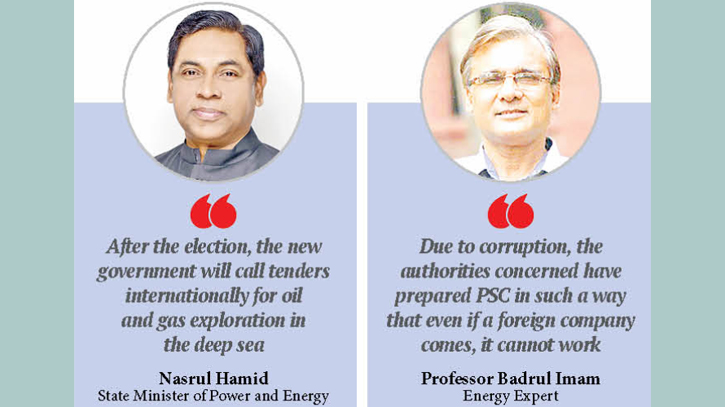
Photo: Messenger
The incumbent government has postponed the signing of a contract with the US-based oil and gas exploration giant ExxonMobil amid ‘cold’ political relationship with the USA.
While a high-ranking US delegation was visiting Dhaka in October to discuss and assess election preparations and the electoral context ahead of Bangladesh's much-talked-about upcoming national polls, the US gas exploration giant ExxonMobil officially proposed to the Energy Ministry for exploring gas and oil in the deep sea.
State Minister for Power, Energy and Mineral Resources Nasrul Hamid told the Daily Messenger, “After the election, the new government will call tenders for oil and gas exploration in the sea.”
According to sources in the Energy Department, international tenders are not being called this year, and talks with Exxon have stopped.
However, US company ConocoPhillips and Korean company Daewoo have gone without completing exploration work in the Bay of Bengal in recent years.
Experts think that as ExxonMobil is the largest and most efficient exploration company in the world, the deal will be good for the country. However, ahead of the much-talked-about election, the pros and cons of the deal should be well scrutinised, aiming to protect the interests of the country.
In a letter, the US company said that they want to conduct two-dimensional (2D) and three-dimensional (3D) surveys in the search for oil and gas in the deep sea of Bangladesh and expressed its interest in signing a memorandum of understanding (MoU) by last August, which has subsequently been postponed.
The US multinational company ExxonMobil has offered to invest $30 billion (three thousand crore dollars) in the exploration and extraction of oil and gas in the deep sea of Bangladesh. ExxonMobil's Opportunity Manager, Jonathan Wilson, has written to the state minister for Power, Energy, and Mineral Resources expressing interest.
In addition, ExxonMobil said in the letter that the company estimated to invest $100 billion if the seismic survey indicates the possibility of viable gas and oil.
A senior official of Petrobangla said that tenders have been called several times to lease the deep-sea blocks, but there has been no response due to the lower price mentioned in the Production Sharing Contact (PSC).
Earlier, the US exploration energy giant has communicated with the government repeatedly, but the government was waiting for the suitable time.
Meanwhile, the government has already amended the PSC to attract international companies to oil and gas extraction. The price of the gas, which was found, has been increased compared to before. The revised PSC was approved by the cabinet in August this year.
The Bay of Bengal has been divided into 26 blocks after maritime disputes with neighboring countries Myanmar and India, 11 of which have rock in the shallow part. There are 15 blocks in the deep sea. ExxonMobil wants to work in the deep sea and is trying to get the lease of these 15 blocks. Since 2014, Petrobangla has been trying to lease offshore blocks but has yet to succeed.
Even if the boundaries are defined geographically, when oil and gas extraction starts from one block, there is a high risk of gas leakage from neighboring blocks.
In this regard, energy expert Professor Badrul Imam said, “Due to corruption, the authorities concerned have prepared PSC in such a way that even if a foreign company comes, it cannot work.”
Experts said that despite the huge potential, there has been no effective initiative to explore for oil and gas in the Bay of Bengal so far. Neighboring countries Myanmar and India have advanced a lot in the discovery of oil and gas in their waters, but Bangladesh is still lagging behind in this field.
In the meantime, several foreign companies have left the sea without completing the search.
A UN tribunal in 2014 awarded Bangladesh 19,467 square kilometers, or nearly four-fifths of the 25,602 sq km sea area caught up in the dispute with India. The multiclient survey required for the full survey has been pending for 8 years. The process of calling international tenders for oil and gas exploration is also getting delayed again and again.
Messenger/Disha








